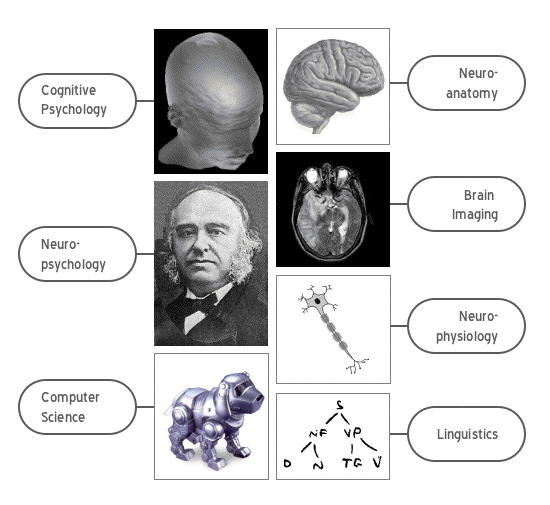

Not long ago, scientists were eclectic generalists. However, over time, the quantity and complexity of accumulated knowledge led to increased specialization among scientists, and breadth of knowledge was increasingly traded for depth of knowledge. As scientists become more specialized, awareness of advances and discoveries in other areas of specialization tend to diminish. This is inevitable and unfortunate, since much can be learned from progress in other scientific disciplines.

Cognitive Neuroscience recognizes the benefit of keeping track of the advances in knowledge in related disciplines:
(a) Neuroanatomy, which informs us on the neurological foundations of language (in the context of this lecture, from possible differences in processing by the left and right hemisphere to the formation of neuron assemblies).
(b) Cognitive psychology, which gives us ways to analyse and understand how language is produced and understood, first by cutting language into more approachable subdomains of study, such as speech perception, word recognition, word production, sentence processing, etc.; second by decomposing each activity into a series of specialized components, with their associated representations and concepts; last by testing these models of language function against data from behavioural studies of normal and impaired individuals, computer simulations and data from brain imaging.
(c) Computational modelling, which transposes he cognitive analysis into completely specified models whose predictions can readily be tested against human performance.
(d) Cognitive neuropsychology and its detailed investigation of patients with neurological disease or brain-damaged patients with deficits selectively affecting a given language function (e.g., oral naming or reading), which constrains models of language processing and theories about the functional architecture of language mechanisms in the brain.
(e) Functional neuroimaging techniques such as positron emission tomography (PET), functional magnetic imaging (fMRI) and event-related potential (ERP), which reveals correlates between brain and language functions by measuring brain activity during language production and comprehension.
(f) Cognitive neuroscience which connects all these disciplines to investigate the organization of the language processes in the brain.
However, due to the general trend towards specialization, convenient access to cross-disciplinary knowledge is not easily available. A student interested in learning about other areas of specialization would have to study texts from many different disciplines. Determining which texts in each discipline are worthy of study would be the first challenge, deciphering the specialized terminology of the texts the second, and enduring the depth of detail the third. The effort is significant, and rarely expended beyond brief excursions into unfamiliar areas to research specific problems. The goal of this quiz section is to assist students with these challenges, to reduce the effort required to learn about the key principles of neurolinguistics across disciplines.